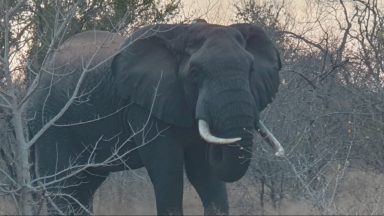These temporary holding bomas in Karingani, Mozambique, have been specially constructed to keep two wild leopards inside. The duo is highly ranked amongst the world’s most dangerous big cats and master escape artists. Made from super-strength metal, the cages are wrapped in canvas in order to shut out all vision of humans on the other side. Every possibility has been thought about to keep the animals secure and safe inside whilst they await transport to Zinave National Park as part of a translocation operation.
Each day, fresh meat is placed inside the cage, through the use of double doorway entry, so that the animal does not pose any threat to the crew. The whole operation is very intense, the sounds of the leopard alone is terrifying! The crew knows that just one swipe from a leopard’s paw can be fatal.
As a new leopard arrives and is placed in its own, separate boma, the other seems to settle. However, at the end of the first week, disaster strikes. Unable to hear the characteristic rumbling sounds from the boma, an investigation quickly shows that a male leopard has torn its way out of the boma, ripping through toughened metal to get out. These cages had been thought to be strong enough to contain the leopard, but such is the drive of these wild cats to be free.
Leopards are listed as Vulnerable on the International Union for the Conservation of Nature (IUCN) Red List, with populations in southern Africa thought to have declined by more than 30% over the past 20 years. This is mainly due to factors such as habitat loss, conflict with humans and poorly-managed hunting quotas. Not only do they plan a vitally important role in an ecosystem, they are also a very attractive tourism drawcard that boosts revenues and creates livelihood opportunities for many people living in these remote landscapes. Successfully translocating these two leopards are therefore critical, so it is vitally important to track and recapture this runaway leopard.
The helicopter is scrambled and the team heads immediately out to find the escaped cat. It is imperative to act fast. Apart from the social and environmental factors, every translocation is also extremely costly and relies on so much goodwill from donors, that the loss of any of this animal really is a disaster for the operation.

